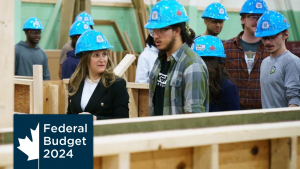Western Canada saw its share of challenges in 2021 with the pandemic casting a wide net over the country.
But beyond the rapid testing, vaccination policies and everchanging case numbers, the construction industry was faced with a multitude of other obstacles such as wild weather, destructive storms and coping with tragedy.
Below are the top five newsmakers of 2021 that the Journal of Commerce covered extensively, and the impacts felt across the sector.
 Kelowna crane collapse shocks construction industry
Kelowna crane collapse shocks construction industry
Five people were killed after a catastrophic crane collapse occurred at a construction site in downtown Kelowna, B.C. on July 12.
The incident occurred at the Brooklyn Bernard Block project, a 25-storey tower being developed by Mission Group. Four of the victims were workers at the site, while a fifth was working in a nearby office building and was buried in the debris.
“There was a catastrophic failure where a crane fell during the dismantling process at our Brooklyn construction site,” said the developer at the time.
The victims of the collapse were identified as brothers Eric and Patrick Stemmer, Jared Zook, Cailen Vilness and Brad Zawislak.
Fundraising pages were set up for several victims shortly after the collapse in the hopes of raising money for the families left behind.
The incident left many in the industry in shock, with several associations and labour advocates expressing their condolences.
“This is a tragedy on so many levels. Our hope is there is something we can learn from this incident to ensure we can avoid it ever happening again,” said Mike McKenna, executive director of the BC Construction Safety Alliance.
Several initiatives took place to raise awareness about crane safety, with BC Crane Safety reiterating the importance of its crane pilot project in Vancouver.
WorkSafeBC also issued a bulletin in collaboration with BC Crane Safety on the hazards and challenges of top climbing a power crane.
 Wicked weather wallops B.C., construction rises to the challenge
Wicked weather wallops B.C., construction rises to the challenge
First it was heat waves and wildfires that scorched many areas of the province during the summer months, then it was devastating floods and landslides in November that left highways and critical infrastructure decimated.
It doesn’t matter how you look at it, B.C. is in a state of rebuilding, retrofitting and rejigging its plans for the future as the province grapples with the undeniable impacts of climate change.
On June 30 a wildfire swept through the village of Lytton so fast many had no time to save their belongings. After the fire, the village discussed rebuilding with resiliency with plans for a net-zero community and has also received funding to help in its recovery efforts.
After a grueling summer, fall approached and brought with it even more destruction. Storms wreaked havoc on the province, with roads and highways taking damage at approximately 200 sites.
Highway 5, also known as the Coquihalla, sustained severe damage with 20 parts of the highway damaged or washed away, impacting 130 kilometres of the 543-kilometre route. These sites include five bridges that collapsed or were heavily damaged.
The construction industry immediately jumped into action.
Roadbuilders, heavy equipment operators and the like have been working around the clock since the storms took place and while it’s estimated it will take months to fully gauge where things stand, significant progress has been made.
As British Columbia Construction Association president Chris Atchison put it: “Whatever the crisis, resilience and recovery always comes back to B.C.’s skilled tradespeople and contractors.”
 Supply chain chaos nearly cripples some construction projects
Supply chain chaos nearly cripples some construction projects
Supply chain problems continued to plague the industry in 2021.
The Ontario Construction Secretariat’s 2021 Contractor Survey, which polls 500 contractors in the ICI sector once a year, found the top concern was supply chain disruption because of the lack of material availability and rising prices.
In Canada, the National Association of Manufacturers conducted a survey of its member companies on current manufacturing impacts and found that over 53 per cent of members were experiencing operational disruptions.
The price of building materials skyrocketed with steel prices increasing 300 per cent in some instances and softwood lumber rising by 150 per cent.
The ripple effect was felt across Canada as contractors struggled to schedule projects accordingly and some even faced delays.
The Mechanical Contractors Association of Canada suggested ways to mitigate the effect and negative impact of these issues, such as timely and early communication, contractual considerations as well as modifications to procurement that can mitigate the impact of sudden price fluctuations.
While mitigation efforts can definitely be implemented, some events in 2021 could not be foreseen, such as the storms in B.C.
B.C. Trucking Association president Dave Earle said hundreds of truck drivers were unable to finish their routes due to the highway closures.
 Industry reacts to court outcomes of Fitzpatrick case
Industry reacts to court outcomes of Fitzpatrick case
This year also saw major movement on the Sam Fitzpatrick workplace fatality case that spanned over a decade in the legal system.
In 2009, Fitzpatrick, 24, was struck and killed by a boulder on a Kiewit hydroelectric project near Toba Inlet, B.C. Investigators wrote hazards weren’t properly controlled and crews continued to work in dangerous areas. WorkSafeBC found the company failed to adequately train workers for the land clearing work. An appeal tribunal for fines levied against Kiewit determined they had “committed high risk violations with reckless disregard.” A criminal investigation was conducted and negligence charges were filed.
In September of this year, just days before the matter was set to go to trial, prosecutors scrapped their case, stating issues with witnesses made a conviction unlikely. The Crown explained a shakeup in witnesses and testimony changes prompted the stay of charges.
Kiewit had always maintained they disagreed with the charges and expressed relief the process was over, agreeing with the Crown’s decision. But those in the industry were not pleased.
The BC Building Trades, which championed the case as well, simply stated: “There is no justice here.”
But the quest for action may not be over yet.
In November, a group met with B.C. Labour Minister Harry Bains and Attorney General David Eby to discuss the Fitzpatrick case and how criminal workplace incidents are investigated and prosecuted. Presentations were made by the BC Federation of Labour, the United Steelworkers and Fitzpatrick family friend Mike Pearson.
 Forging through another year of COVID-19
Forging through another year of COVID-19
The construction industry was not immune when it came to addressing concerns relating to the COVID-19 pandemic.
While several outbreaks occurred at large sites across B.C. and Alberta, for the most part construction fared well and was able to continue working as an essential service.
But that doesn’t mean there weren’t several other variables that had to be considered. Rapid testing was introduced along with vaccinations for workers, bringing to light issues of mandatory vaccination policies, the rights of workers and overall health and safety at sites.
It is clear, at least for the foreseeable future, those questions will remain as the pandemic moves into 2022.











Recent Comments
comments for this post are closed